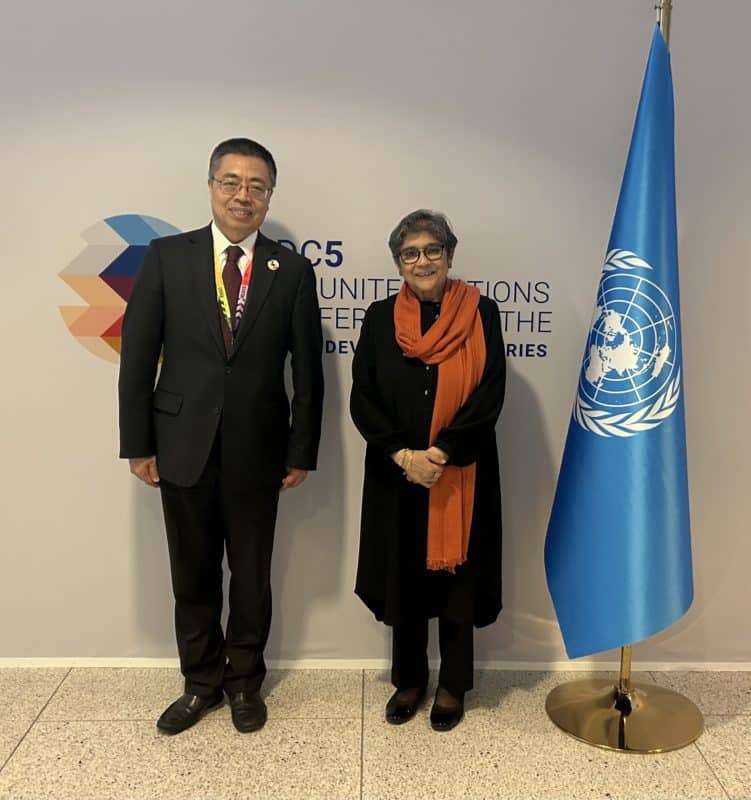
By Rabab Fatima, UN Under-Secretary-General and High Representative, UN-OHRLLS and Xiangchen Zhang, Deputy Director-General, WTO
As the world’s least developed countries (LDCs) work to build more resilient economies and lift their populations out of poverty, international trade offers them a proven route towards sustainable development. This is why trade is a key pillar of the Doha Programme of Action which maps out commitments between LDCs and their development partners for the 2022-2031 decade.
With the LDCs’ share of global trade having stagnated at less than 1% in recent years, things need to change. Much more can and should be done to help LDCs gain the benefits of trade, which include better quality jobs, stronger economic growth and increased productivity. The Doha Programme of Action sets an ambitious target of doubling this share by 2031.
To gain a deeper understanding of what LDCs could explore to boost their exports, our offices organized regional consultations in Ethiopia and Cambodia. These were arranged in the context of the 5th United Nations Conference on LDCs (LDC5). The consultations were attended by nearly 100 senior trade officials from over 40 LDCs, who discussed their trade challenges and priorities, plus how the development community can best support them in achieving their ambitions.
Here are some key takeaways:
- Multilateral cooperation can help LDCs tap opportunities in digital trade
Digital trade represents a fast-growing opportunity for LDCs to expand their share of global trade on a more equal footing with higher-income countries. For example, selling through digital platforms offers exporters lower-cost access to customers in other countries which would have been difficult otherwise.
Multilateral and regional cooperation could help LDCs grasp this opportunity more effectively and derive more benefits from digital trade, participants argued. For instance, findings from the Digital Trade Integration Project show that LDCs have fewer policies in place that enable digital trade than do high-income countries. Yet, when LDCs participate in those discussions, they can often access technical assistance that helps them upgrade their policies and regulations to facilitate digital trade.
Such forums also give LDCs the chance to voice concerns and argue for their interests when trade rules or practices that impact them are being negotiated.
- LDCs need targeted and nimble capacity-building support
Finding more effective and efficient ways to boost LDCs’ capacity to trade is critical.
LDC participants flagged they need more support from the international community, especially in reducing trading costs, addressing productive capacity constraints, and participating in global supply chains. They also highlighted partner practices that have proven most impactful, including engaging the private sector and facilitating country ownership.
Participants added that future multilateral trade support for LDCs should be more inclusive and fit for purpose. A stronger coordination mechanism, with robust monitoring, learning and evaluation capabilities, is needed to ensure that LDCs’ changing needs and requests are responded to nimbly.
- Regional integration can help LDCs boost their trade and become more resilient
Deepening regional integration can help LDCs expand and diversify their exports and strengthen the resilience of their economies.
Full implementation of the African Continental Free Trade Area (AfCFTA), for example, could result in a 34% increase in inter-African trade by 2045, according to the UN Economic Commission for Africa. AfCFTA promises to be particularly beneficial for key productive sectors, like agriculture and services, helping reduce African economies’ reliance on energy and mining. This should make LDCs on the continent more resilient against external shocks.
Regional integration is also becoming central to Asian LDCs’ graduation strategies. For example, as well as being a member of the Regional Comprehensive Economic Partnership (RCEP), Cambodia recently signed bilateral free trade agreements with China and the Republic of Korea and is currently negotiating another such agreement with the United Arab Emirates.
Another trend is for LDCs in the region to build regional networks via preferential trade arrangements that include digital and sustainable development provisions.
- LDC graduation and transition strategies require further focus
As more countries graduate from LDC status, participants expressed concern that some will lose trade preferences related to market access. Although some LDC trading partners already grant LDC graduates a transition period, LDCs want more of their trading partners to extend such preferences. They would also like to continue benefiting from LDC-specific special and differential treatment provisions in the WTO.
A sustainable graduation support facility (iGRAD) designed to support a smooth transition for graduating LDCs was launched at LDC5. With over a third of all LDCs already on track to graduate from LDC status – and the Doha Programme of Action calling for an additional 15 to be supported to meet the graduation criteria by 2031 – the international community has an urgent responsibility to help them develop comprehensive transition strategies.
The global trading landscape is evolving fast. Trade priorities of tomorrow will not be the same as trade priorities of today. It is high time that LDC policy makers start exploring new frontiers to bring greater opportunities to businesses, to increase income and to raise living standards of one billion living in LDCs.